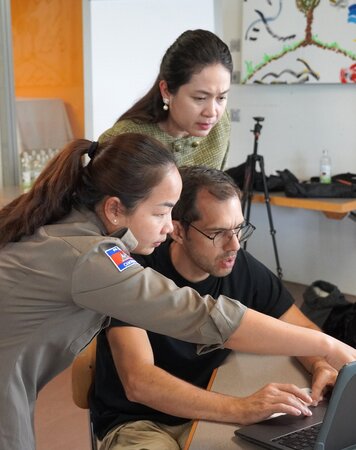Are you a mine action manager? This course is designed to improve your operational and managerial practices for you and your team.
Aim
The course aims to enhance capacity of participants to handle their day-to-day operational and managerial duties within their respective humanitarian mine action programmes, through the use of improved planning, implementation, monitoring, assessment and evaluation practices.
What you will learn?
The course strengthens participants’ capacity to:
- Explain the governance and liability concepts applied to mine action operations, including the International Mine Action Standards (IMAS) and their relationship with national mine action standards (NMAS) and organisational standard operating procedures (SOP);
- Conduct effective and efficient operational planning and implementation of mine action survey and clearance operations;
- Develop leadership and management good practices using individual tool sets and the enhancement of personal leadership styles;
- Improve the ability of personnel to communicate with and influence staff at the operational level.
Who should attend?
- Staff involved in the operational management of national mine action programmes;
- National and international mine action operators working in a similar capacity in the middle management of humanitarian mine action operations;
Donors
General requirements
Recommended to take first:
- Understanding the International Mine Action Standards (IMAS)
- Introduction to explosive ordnance risk education (EORE) essentials e-learning course
- ‘Introduction to GIS for mine action e-learning course’
Mandatory e-learning courses to complete
Selected participants are required to complete the following GICHD e-learning courses:
- Introduction to gender and diversity in mine action
- Mine action and sustainable development. Maximizing impact with global agendas
Language level requirements
Participants should be able communicate and present on their national standards in English. The following standards of proficiency in English should be met (as described in STANAG 6001).
- Listening: good | 3
- Speaking: fair | 2
- Reading: fair | 2
- Writing: elementary | 1
Language requirements are compulsory and should be confirmed by applicants’ superiors.
Equipment requirements
Minimum Technology Requirements
- Computer with up-to-date web browser.
- Google Chrome is recommended
- Mobile phone
Computer Skills
- You will be required to: Navigate the web Interact with the Blackboard Learning Management System
- Utilize word processing software
- Enable audio and video settings on your device(s)
Teaching approach
The course has been designed as a blend of these equally important elements:
- Interactive self-study: articles, videos, quizzes, online discussions and e-learning components and pre-course baseline test
- In-person training: practical application of the knowledge and skills learnt.
- Impact assessment survey: the survey will be sent out 9 months after the training to enquire about the impact of the training on the individual and organisational performance.
Assessment
- During the course participant performance will be evaluated. The overall grade for the course consists of 3 elements:
- Individual evaluation of performance during the exercises;
- A final written test
- Note: The pre-course baseline test will be released to you during the first week of the self-study phase. You will receive a notification to your emails and instructions on how to complete it. The results of the test do not affect the course final grade.
Travel & Accommodation
After preliminary confirmation of selection, a letter of recommendation from the applicant's supervisor will be required.
The registration form should be filled in no later than 15th February 2025
In addition to national and international staff of mine action organisations, the course is also open to NATO/PfP, MD, ICI and Contact States.
Cost
The Swiss Government will cover participant expenses for food and accommodation while in Spiez (Sunday, 15 June 2025, earliest date of arrival to Saturday, 28 June 2025, latest date of departure).
Transportation and Sponsorship
Travel costs from country of origin to Zurich, Switzerland has to be covered by each respective organisation. It is recommended that all participants schedule an arrival in Zurich, Switzerland no later than Sunday, 15 June 2025,
A limited number of sponsorships covering travel expenses from country of origin to Spiez might be available for applicants with no other funding opportunities from developing countries. Applicants wishing sponsorships for flights must contact the GICHD at pfp(at)gichd.org before registering and no later than the application deadline on 15th February 2025
Train tickets Zurich Airport – Spiez – Zurich Airport will be reimbursed to the participants (only second-class tickets).
Insurance
The DDPS and the GICHD do not cover health care expenses. All participants are themselves responsible for adequate insurance (health, accident and liability) or need a Governmental guarantee to cover any health care expenses in Switzerland.
Cancellation
The course is subject to final funding confirmation.
The GICHD has the right to cancel the course latest two weeks prior to the training should it not reach the minimum number of participants.
Visa
Participants requiring a visa should apply at the Swiss Embassy in their country. Invitation letters can be provided by the GICHD.
Location
Schachenstrasse 43
Spiez
Switzerland
3700

